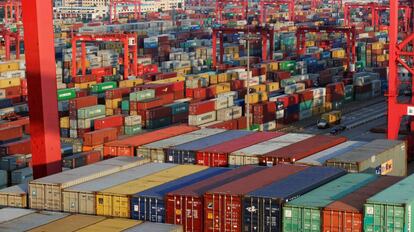IMF warns about Spanish economy’s vulnerability from external imbalance
But the world body also noted that Spain has had its fifth annual consecutive current account surplus

Spain’s net international investment position (NIIP), or the difference between its external financial assets and liabilities, has improved from -94% of GDP in 2009 to -81% in 2017. Despite this improvement, the International Monetary Fund (IMF) is warning about the potential risks it poses to the Spanish economy.
In its 2018 External Sector Report, the global body notes that “the large negative NIIP comes with external vulnerabilities, including from large gross financing needs from external debt and potentially adverse valuation effects.”
Internationalization efforts by Spanish firms contributed to the strong export growth
IMF report
The overall assessment for Spain is that “its external position in 2017 was moderately weaker than consistent with medium-term fundamentals and desirable policy settings.”
The July report mentions two mitigating factors: a favorable maturity structure of its outstanding sovereign debt, averaging seven years, and European Central Bank (ECB) measures that lower the cost of debt. The report fails to mention, however, that the ECB has plans to gradually scale back its extraordinary liquidity measures.
Another positive trend is the improvement to Spain’s current account (CA) balance. The study notes that after a peak CA deficit in 2007 of 9.6% of GDP, “exports and imports have since grown strongly along with the economic recovery, leading to CA surpluses in 2013-2017.” Analysts noted that this is Spain’s fifth consecutive annual CA surplus, “unprecedented in recent Spanish history.”
“Internationalization efforts by Spanish firms contributed to the strong export growth, and an increase in Spain’s share of world goods exports,” the report adds. Analysts expect that these current account surpluses will continue in the medium term “notwithstanding the recent appreciation of the euro and the projected moderately higher oil prices.”
The IMF recommends additional labor market reforms
The IMF mentioned structural and labor market reforms, as well as fiscal deficit reductions, as determining factors in Spain’s reduction in imbalances. But it recommended “reducing the still sizable structural fiscal deficit to lower the remaining imbalances.” The body also recommended additional labor market reforms.
Globally, the report said that “overall current account surpluses and deficits remained broadly unchanged, at about 3.25% of world GDP in 2017, with growing concentration in advanced economies.”
“Higher-than-desirable balances prevailed in the euro area (driven by Germany and the Netherlands), other advanced economies (Korea, Singapore, Sweden), and China. Lower-than-desirable balances remained concentrated in the United States, the United Kingdom, some euro area debtor countries, and a few vulnerable emerging market economies (Argentina, Turkey).”
English version by Susana Urra.
Tu suscripción se está usando en otro dispositivo
¿Quieres añadir otro usuario a tu suscripción?
Si continúas leyendo en este dispositivo, no se podrá leer en el otro.
FlechaTu suscripción se está usando en otro dispositivo y solo puedes acceder a EL PAÍS desde un dispositivo a la vez.
Si quieres compartir tu cuenta, cambia tu suscripción a la modalidad Premium, así podrás añadir otro usuario. Cada uno accederá con su propia cuenta de email, lo que os permitirá personalizar vuestra experiencia en EL PAÍS.
¿Tienes una suscripción de empresa? Accede aquí para contratar más cuentas.
En el caso de no saber quién está usando tu cuenta, te recomendamos cambiar tu contraseña aquí.
Si decides continuar compartiendo tu cuenta, este mensaje se mostrará en tu dispositivo y en el de la otra persona que está usando tu cuenta de forma indefinida, afectando a tu experiencia de lectura. Puedes consultar aquí los términos y condiciones de la suscripción digital.








































